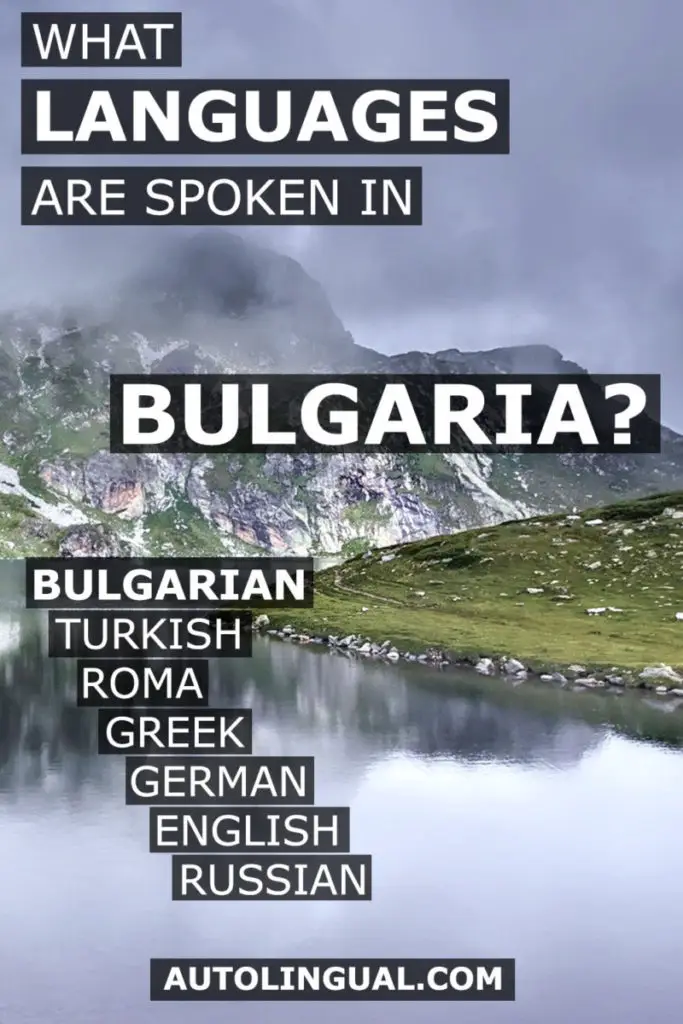What Languages Are Spoken In Bulgaria? (Other Than Bulgarian)
Bulgaria is a South-Eastern European country with around 7 million inhabitants who speak mostly Bulgarian.
Surprisingly, Bulgaria isn’t as linguistically diverse as many of its neighboring countries. The South-Eastern neighbor, Turkey has a lot of minority languages, Bulgarian included, and to the North Romania, too has a certain linguistic diversity.
In Bulgaria, the main first languages are Bulgarian, Turkish and Romani. In terms of foreign languages, English and to some extent, Russian are the most common choices.
In the following, I’ll try diving a little deeper into each of these languages.
Bulgarian - The Primary Language Of Bulgaria
Bulgarian is a South-Slavic language closely related to Macedonian. Bulgarian and Macedonian speakers are able to understand each other when speaking each one his or her own language - for the most part.
The Bulgarian language is a little more distantly related to the other languages in the broader Slavic language family, like Russian. While these languages aren’t mutually intelligible, comparing the two will reveal that they are relatively similar.
There is, however, something quite unique about Bulgarian (and Macedonian) when you compare them to the rest of the Slavic languages. While most Slavic languages have a lot of grammatical cases that the learner needs to master, in Bulgarian, only a very limited case-system remains.
Likewise, Bulgarian, unlike other Slavic languages, has no infinitive verb-form, yet it has others that don’t seem to exist in related languages.
In Bulgaria, around 85% of the population speaks Bulgarian as their first language, but the rest of the population will speak Bulgarian as a second language too - except for recent immigrants, of course.
The Turkish Language In Bulgaria
Close to 600.000 ethnic Turks live in the southern part of Bulgaria. This makes up close to 9% of the country’s population, which is quite significant!
The Turkish population in Bulgaria isn’t really the result of recent immigration, though. In fact, most of the Bulgarian Turks are said to have settled in Bulgaria during the Ottoman reign up to 5-700 years ago, and some speculate that Turkic tribes might have settled the area even earlier.
What’s interesting is, that despite the Turkish group’s long history in Bulgaria, 96.4% of Bulgarian Turks still consider their mother tongue Turkish. This speaks to a strong cultural identity in the Turkish community in Bulgaria.
Turkish, as a language, is completely unrelated to Bulgarian, in that it belongs to the Turkic language family, which isn’t even Indo-European.
The Romani Language In Bulgaria
About 300.000 people or close to 5% of Bulgarians speak Romani as their first language.
Romani is an Indo-Aryan language that the Roma people brought with them when they originally started migrating to the Middle-East and Europe from the Indian sub-continent close to 1500 years ago.
In Bulgaria, the Romani people have represented an important part of the population for centuries, and for the most part, the Romani have preserved their language, culture and traditions with only limited assimilation into Slavic (and Turkic) culture.
While there is a connection between the Indo-European and Indo-Aryan language families, the difference between them is so big, that the Romani language effectively has very little in common with other European languages today, Bulgarian included.
The Greek Language In Bulgaria
There used to be a significant Greek minority in Bulgaria of more than 2% of the country’s population by the end of the 19th century.
After the first world war, the majority of these Greek Bulgarians were forced to leave Bulgaria, mainly because of racial tensions in the country.
Today, only a little over 1000 Greeks remain in Bulgaria, meaning that the Greek language no longer has a big importance in the country.
The German Language in Bulgaria
An even less significant minority language in Bulgaria is German. Bulgaria saw settlements by German crusaders during the middle ages, and despite hostility between the Germans and the Byzantine Empire which ruled Bulgarian territory at the time, the German minorities managed to settle and become gradually more influential.
By the end of the 19th century even the Bulgarian monarchs were of German descent. The high influence of the German Bulgarians didn’t reflect in the population numbers, however.
Today, under 500 German Bulgarians still live in Bulgaria.
Foreign Languages In Bulgaria
Other than native languages, there are also the languages that Bulgarians study in school and learn as second languages.
Currently , only 25% of Bulgarians have a working knowledge of English, a number that’s slightly higher than the 23% who speak Russian and 8% who speak German.
When asked, 90% of Bulgarians see the English language as the most beneficial language to be taught to children, followed by German at 36% and Russian at only 14%.
This points to a clear switch in the second-language landscape of Bulgaria, a country where Russian used to be important, being part of the Soviet Union.
The current educational system seems to further enforce the future status of English in Bulgaria. In 2015, 99% of Bulgarian school children were learning English and 17% were learning Russian according to Eurostat.

